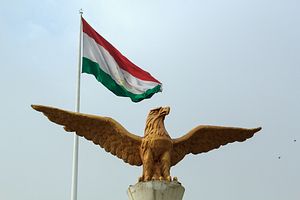Never a bastion of democracy, the post-Soviet republic of Tajikistan has just become a one-party state. The regime blamed the country’s leading opposition party, the Islamic Renaissance Party, for an attack on September 4 that left 14 dead. In the wake of the violence, the security services detained at least 13 senior members of the party.
“This is a very dangerous situation,” the visibly-shaken party leader Muhiddin Kabiri told me. “My deputies are terrified of being taken away by the security services.”
Now in the safety of a European country, Kabiri flatly denies orchestrating the attacks. And many outside observers agree. The accusations are “completely implausible,” argues expert Tim Epkenhans from the University of Freiburg.
Instead, Deputy Defense Minister Abdulhalim Nazarzoda — an opposition commander during the country’s post-independence civil war who was later incorporated into the administration– led the recent attacks. Like other officials, he used his position to amass a fortune in Tajikistan’s shady economy. When the regime decided to purge him in early September, he decided to go out with a bang. And go out he did. The special forces killed Nazarzoda on September 16. The Tajik government claims that he acted on Kabiri’s orders, but have not provided any evidence to back up that claim.
The rebellious minister proved to be a gift to a regime bent on squashing the opposition.
“The regime has worked on the ban [of the Islamic Renaissance Party] for some time,” argues Epkenhans. Following a sustained government campaign to defame the party, it lost its two seats in the parliament in the March election. With the opposition denied a voice in parliament, the government began closing the party’s local offices. Last month the authorities issued a decree banning the party from conducting political activities. State regulators began requisitioning party property last week.
Tajikistan is becoming a model dictatorship rivaling the worst human rights abusers in the world.
“The state is run as the fiefdom of corrupt officials running all the way up to the president,” Nate Schenkkan, Project Director for Nations in Transit at Freedom House, says. Strongman President Emomali Rahmon has held a firm grip on power since 1992. Those who cross him have fled, are languishing in jail, or have been exterminated. Corrupt officials plunder the country’s economic resources and channel those funds into offshore accounts. In addition, over a million Tajik citizens now work in Russia. Money sent back by migrant laborers constitutes over half of the economy. Drug trafficking from Afghanistan makes up a large part of the rest.
Far from being the extremists that the government claims, the Islamic Renaissance Party has consistently shown its commitment to democracy and the secular state. In such a toxic political climate, the party offered hope to thousands of people. During the two years that I lived in Tajikistan, I visited the party’s headquarters on a regular basis. Unlike other officials in Tajikistan, Kabiri welcomed visitors and patiently listened to their problems for hours on end. In a country where the media is tightly controlled, the party gave voice to concerns about creeping authoritarianism and defended the multi-party system.
All of that is history now. Leading party members are likely to spend the rest of their lives in jail in a country where torture is widely used. Ultimately, in attempting to secure its own power the regime may be shooting itself in the foot. The banning of the party will prove “disastrous” for the country, according to Epkenhans. With only one party, he argues, there will be “no opportunity to raise a mildly dissenting voice in Tajikistan.”
Without a way to voice their anger through legal channels, young people will be more likely to resort to violence in opposing the regime. Most disenchanted people will simply give up on the stagnating country. Educated young people are already leaving in droves; ironically, Russia offers more civil liberties and economic opportunities than Tajikistan does.
So far, the United States has watched these developments idly. And this deafening silence has only emboldened a regime that is reliant on U.S. security assistance. “It is extremely urgent that the U.S. government speak out at a very high level about the crackdown on the IRPT,” Schenkkan argues.
The United States can and must act. Security is built on democracy, and the current path that Tajikistan is taking could lead to chaos. Given the regime’s reliance on external aid, Washington has leverage and it must use it.
“If the international community does not intervene,” Kabiri told me, “there will be a great tragedy.”
Edward Lemon is a doctoral candidate at the University of Exeter. In his research, he examines the relationships between security and religion in Tajikistan.

































